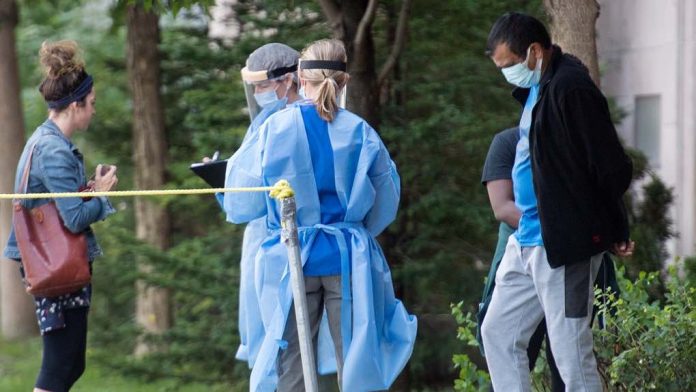Quebec’s health minister says a vaccination passport system will be implemented on Sept. 1 to combat rising COVID-19 cases and an “inevitable” fourth wave.
“Taking into account the increase in cases, the fall coming up with the back to school and back to work and the expected prevalence of the delta variant, the conditions are there to deploy the vaccination passport,” Christian Dubé said.
Dubé unveiled some details about the system, announced last week by Premier François Legault, alongside two public health officials — Dr. Yves Jalbert, a strategic medical adviser, and Caroline Roy, an adviser on matters related to the COVID-19 vaccination campaign.
Dubé says the systems will be implemented in places with high capacity and a high rate of contact, such as festivals, bars, restaurants, gyms and training facilities to avoid the widespread closures that marked the first waves of COVID-19 in Quebec.
For the time being, the vaccination passport will not be used in retail stores or schools.
When asked about religious gatherings and weddings, Dubé said the government is still discussing whether or not they will be included in events that will require vaccine passports.
Dubé emphasized the system is the only way to keep the economy open and still protect the health system from being overwhelmed as it was in previous waves. He says a fourth wave, driven by the delta variant, is “inevitable” in Quebec.
While clients of certain non-essential services, like bars, will need to be vaccinated and have a QR code to prove it, the same will not be required of staff. Dubé says that mandating vaccines for staff would break labour laws.
The passport will be used on an app that is being tested this week. Two pilot projects are planned: one at a sports bar in Quebec City starting Wednesday for two days, another next week at a gym in the Vimont district of Laval, just north of Montreal.
Dubé says the government wants to have the smartphone application ready for use across the province by September, though people who do not have a smartphone will be able to use the paper vaccination certificates issued at vaccine centres.
Dube says the application will read the QR code sent to people who have been vaccinated against COVID-19, adding that both businesses and clients will need to download the software.
As for what kind of data the app collects? “None… It’s only a reading application, that’s it,” Dubé clarified.
So far, 84 per cent of Quebecers have received a first dose, Dubé said Tuesday.
He said he’d like to see all of those who have had one dose receive a second by the end of the month, meaning 1.1 million doses need to be administered by Aug. 31.
‘A useful tool’
Dr. Gaston De Serres, a medical epidemiologist with the province’s public health institute, believes a vaccination passport system would fare well at encouraging adults aged 20 to 39 to get vaccination. Vaccine bookings already shot up after Legault’s announcement last week.
“We need to improve the vaccine coverage in these age groups which, at the present time, is clearly insufficient,” De Serres said, pointing to the group’s vaccination rate sitting under the province’s 75 per cent benchmark. He says this age group makes up about 50 per cent of the province’s new cases.
“So the vaccine passport in this regard is certainly a useful tool to be an incentive for people to be vaccinated.”
Quebec’s civil liberties union, the Ligue des droits et libertés (LDL), though, is taking issue with the vaccine passport system, saying there has not been any time for a proper public debate and citing concerns about data security.
“One thing that bothers us right now is that the vaccine passport is being presented as if it were some kind of miracle solution,” said co-ordinator of the LDL Catherine Descoteaux, who wants to avoid “creating a false sense of security in the population” when herd immunity has not yet been achieved in Quebec.
Quebec will be the first Canadian province to require two doses of the COVID-19 vaccine to access certain services, though Manitoba and Prince Edward Island have similar measures.
































